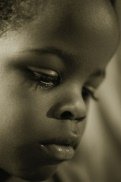|
Children with Depression - A sad and angry bunchChildhood depression is a very real fact. As our society struggles with more divorce, trauma, death, and deep financial despair our children fall victims to the chaos. Living with the chaos can result in legitimate clinical depression. That is not to say that chaos has to exist for one to be depressed. Clinical depression does have biological basis and can strike at any time. 
WRONG! Sad children do not mimic little sad adults. And unfortunately, the DSM-IV-TR® does not separate clinical symptomatology for adults versus children. So here are some specific symptoms and noted differences when evaluating children:
The above is not a complete list of criteria from the DSM-IV-TR®. However, it is a list that in my own experience are the symptoms you are most likely to see in children. That said, I will say that most of the depressed kids I see at work appear angry. Flat out get in your face and tell you off angry! Sure, they might cry too, or have somatic complaints with no obvious basis. But mostly what they are is pissed off, frustrated, temperamental, edgy, you name it. And - they can get that way at the drop of a hat over absolutely anything, no matter how small or insignificant.
The most common treatment traditionally takes the form of
medical intervention.
However, there are also numerous alternative and complementary therapies that one can consider. For a generous compilation of ideas, including resources in various areas across the globe, visit
Shared-Care.

I think it is important to note that sometimes these kids look like something else. Their anger might cause people (like school staff for example) to consider them defiant and emotionally disturbed. Their lack of focus coupled with lack of interest in activities might cause one to wonder about an Attention Deficit Disorder (ADD). Be careful - it is very important to not only consider the obvious symptoms but also the family history. A person is up to 3 times more likely to suffer a major depressive disorder if they have a first-degree biological relative (ex. parent/child) who suffers as well.
|






